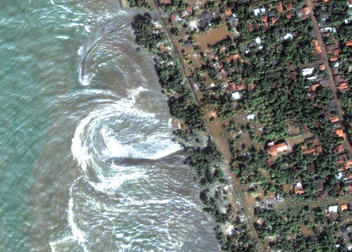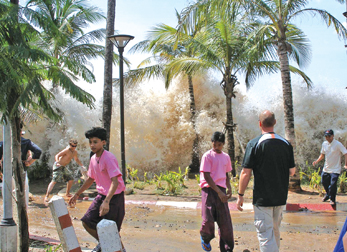Boxing Day tsunami - lessons for the future
by Pramod DE SILVA
 'Padma' cannot really remember who she is and where she comes from.
Passersby in Ratnapura used to toss coins and currency notes at Padma,
begging on the sidewalks. 'Padma' cannot really remember who she is and where she comes from.
Passersby in Ratnapura used to toss coins and currency notes at Padma,
begging on the sidewalks.
Premawardane has been mourning the loss of his sister for the last
five years. The last day he saw her was December 26, 2004. She was
travelling to Matara on the Samudra Devi (Queen of the Sea) train.
Little did he, or she, know that fate had other plans in store. Massive
ocean waves engulfed the train at Peraliya, killing around 1,500
passengers and villagers. They didn't even know what hit them - only a
few people even knew the term for such a wave - tsunami.
Nearly 40,000 people in coastal areas around the island perished and
550,000 were rendered homeless by the tsunami, caused by a gigantic 9.5
undersea earthquake off the island of Sumatra. Sri Lanka, was only one
of the 13 countries affected - Indonesia saw the largest number of
casualties in Aceh and elsewhere, while Thailand and India also suffered
loss of lives and property. Several countries in Africa were also hit by
the tsunami as it fanned out and dissipated.
A chance errand brought Premawardane to Ratnapura just last week.
There he saw a beggar woman who closely resembled his sister Padma. He
went back to Colombo and accompanied his other sister to Ratnapura. With
the consent of the Police, they brought her back. But Padma, or whoever
she is, has changed a lot during the last few years and only a DNA test
will be able to ascertain the truth.
This is a story of the tsunami, but not the only one. There are
millions more stories like this and even worse.
Whole families were wiped out. Many children lost their parents and
vice versa. Millions of houses were reduced to rubble, leaving the
occupants who survived the onslaught of waves only with the clothes they
were wearing.
 Five years later, the scars of the tsunami, physical and mental,
still remain. But Indian Ocean countries have made it a point to 'build
back better' after the tsunami. Coastal communities have sprung back to
life as Governments have tried their best to rehabilitate their
shattered lives and rebuild their homes, schools, hospitals and places
of worship. Five years later, the scars of the tsunami, physical and mental,
still remain. But Indian Ocean countries have made it a point to 'build
back better' after the tsunami. Coastal communities have sprung back to
life as Governments have tried their best to rehabilitate their
shattered lives and rebuild their homes, schools, hospitals and places
of worship.
Earthquakes cannot be predicted, but the damage they cause can be
controlled if action is taken to immediately notify residents. This is
the challenge facing Indian Ocean countries.
The 2004 tsunami was a wake up call - nearly all countries received a
tsunami warning, but no one listened. But are we ready for the next big
wave ? The answer seems to be yes. Sri Lanka and all tsunami affected
countries are now part of an early warning network stretching from the
east coast of Africa to the US State of Hawaii.
The system employs high-technology deep sea buoys to pinpoint the
depth and strength of movements in the sea bed.
It has been tried and tested successfully on a couple of occasions.
There have been a few undersea earthquakes in the region since 2004,
though none was as powerful as the Boxing Day one. But we cannot predict
the next big one - it can be tomorrow, next year or in 2050. The best
approach is to be prepared for any eventuality.The tsunami was
undoubtedly a tragedy of the highest proportions, but it was also a
lesson for humanity. Here in Sri Lanka, we were moved by the massive
outpouring of sympathy for the victims regardless of all ethnic and
religious divisions. It was a moment that symbolized the strong bonds of
friendship and unity among all communities. All political parties forgot
their differences and joined hands to rebuild the country. The
international community too came to the rescue of affected nations,
first with search and rescue teams, then with food items and relief
materials and later with financial aid for rebuilding - total aid
pledges, including official aid and private donations exceeded $13.6
billion for the 13 countries.
In a report commissioned by the five countries hit hardest by the
2004 tsunami (Sri Lanka, Indonesia, Thailand, India and the Maldives)
and presented to the United Nations earlier this year, it was
recommended that involving local communities in the recovery process is
as instrumental as installing high-tech early warning systems. The
report also highlights the need for governments to incorporate disaster
risk reduction measures in national development plans.
Real progress has been made in the recovery process. Communities
devastated by the 2004 Indian Ocean tsunami have "built back better" and
lessons were learned for future disaster recovery, says former US
President Bill Clinton, who served as U.N. special envoy for tsunami
rebuilding. Clinton visited Sri Lanka and other tsunami-hit countries
soon after the catastrophe. In fact, no trace of the tsunami can now be
seen in most coastal areas of Sri Lanka and Indonesia.
There were other lessons as well. Countries which have protected
their mangroves, such as Bangladesh, suffered remarkably minor damage.
Hundreds of thousands of hectares of mangroves - many of which had been
cleared for shrimp and fish farms - were being replanted in Indonesia,
Sri Lanka and Thailand after experts said they could have provided a
barrier to slow the tsunami. Several countries have also earmarked zones
where new constructions are not permitted to reduce the impact of a
future tsunami.
Yet, the final hurdle will be very difficult to overcome. Clearing
the emotional debris will be the biggest challenge of all. Coastal
dwellers will continue to fear the sea, on which most of them depend for
a livelihood.
The loss of loved ones cannot be effaced from their minds easily,
even if they have got brand new houses. Deep down, it will be a tragedy
they want to forget, but cannot. As a nation and a region, we cannot
ever forget the massive destruction caused by the tsunami. Nor can we
forget its emotional fallout. But the best approach is to learn vital
lessons from the tsunami and move on, to face any such natural disaster
in the future with the least loss of lives. |

